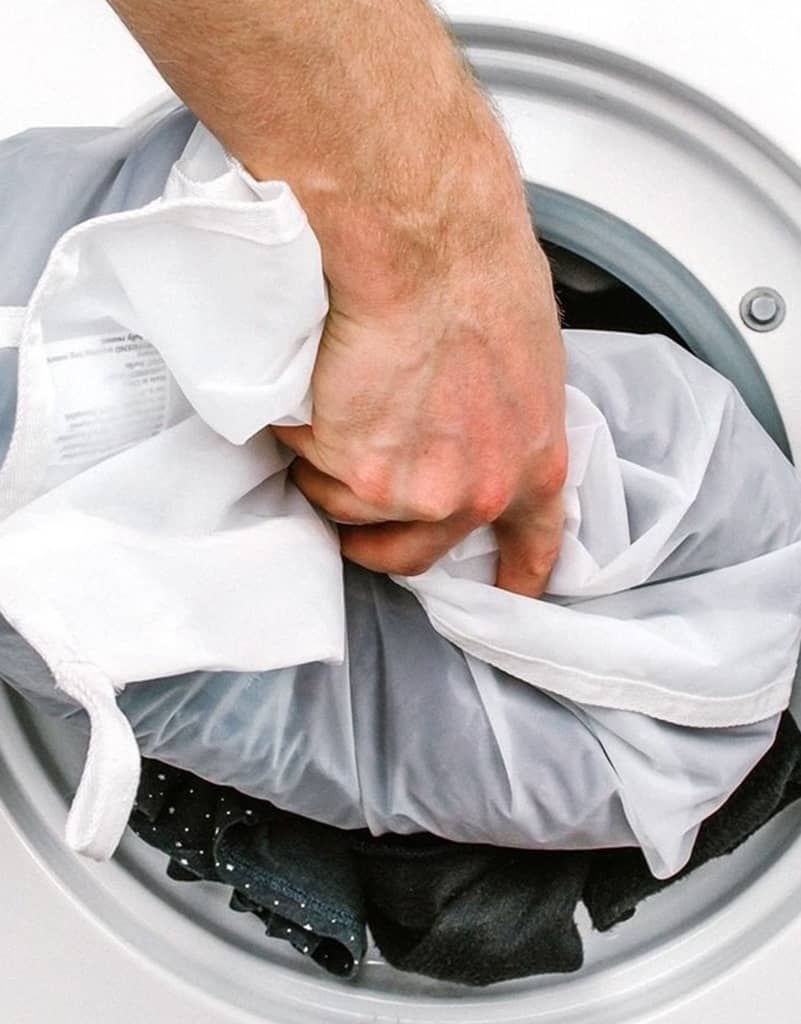-
-
-
-
-
Currency
living
The Laundry Hack Saving Your Clothes (And The Ocean)


Picture plastic particles less than five millimetres wide – some so minuscule they’re 150 times smaller than a human hair.
They’re called microplastics and we unwittingly bring them into our homes every day through a range of items, including synthetic clothing, home furnishings, cosmetics and food products.
Microplastics wreak chaos on the environment. They take hundreds if not thousands of years to break down, affect the health of soil fauna and pollute waterways. There are an estimated 24.4 trillion pieces of microplastics in the world’s upper oceans, many of which will be consumed by marine life. Scientists have discovered microplastics in 114 aquatic species alone, more than half of which are popular dining options (bon appétit).
Facts like these leave many people wondering what they can do to help the microplastics problem. It’s not easy to totally eradicate them from your life, but you can dramatically reduce the amount you let into waterways just by washing your clothes differently. Did you know each time you put a load of your synthetic clothing (fabrics like nylon, polyester and lycra) into the wash you’re releasing millions of microplastics into the wastewater system? While it’s alarming, it’s also led to one of the biggest innovations in this area: Guppyfriend.
Guppyfriend is a mesh laundry bag that goes into your washing machine and captures shedding fibres as clothes are tossed and spun, preventing them from entering waterways. It’s the first device designed and marketed specifically to prevent microfibre pollution. While catching plastic fibres with a plastic bag might sound ironic, the Guppyfriend is actually made of monofilaments, which consist of only one endless thread that is more like a stable stick in its structure than many loose threads. This helps it capture 99 per cent of fibres.
Guppyfriend is a great solution for pollution caused by clothing but there are other ways you can keep microplastics out of your home (and waterways) too.
Choose natural fibres over synthetics
While a Guppyfriend will help you keep your favourite synthetic black party shirt in rotation, it’s easier to keep microplastics out of your washing machine by buying clothing made from natural fibres. These materials still shed but they aren’t harmful and will biodegrade over time. Some of our favourite natural fibres include cotton, which is versatile and can be used for loungewear or dresses; linen, which is perfect for casual shirting; and hemp, which is increasingly being blended into many of the pieces on our wishlist.
Get rid of any skincare holding nasties hostage

Documented By: Guppyfriend
Get rid of any skincare holding nasties hostage
Microbeads used to be a desired ingredient in personal care products such as toothpaste and facial washes, but we now know that they are a harmful pollutant, entering waterways and being consumed by sea life. Though microbeads have now been banned in many countries around the world, be sure to check the ingredients list of any old or new products and avoid those containing polyethylene.
Try to steer clear of single-use plastics
Hopefully we’re all trying to do this anyway, but here’s another gentle reminder to opt for products packaged in glass instead of plastic and use reusable non-plastic containers wherever possible. The top offenders for single-use plastics that break down into microplastics are water bottles, disposable coffee cups, plastic straws, plastic cutlery, plastic bags and plastic food packaging.
Drink filtered tap water
We’ve all been caught unprepared on a hot day and had to buy a plastic-packaged bottle of water. Not only do these end up in landfill, but bottled water also has about double the microplastic level compared to tap water. So try to remember to fill your reusable (preferably glass or stainless steel) bottle up before you leave home, or go one step further and purchase a tap filter that helps catch microplastics on their way through.
Minimise indoor dust
According to studies, a large proportion (almost 40 per cent) of household dust is actually microplastics. So, whether you’re a clean freak or not, make sure you’re vacuuming the floors at least once a week. And, bonus, you can pop an air purifier in your home, such as one from Blueair, which claims to remove 99.97 per cent of airborne particles down to 0.1 micron, including microplastics.
SHOP THE STORY
View All (1)
ABOUT US
CUSTOMER CARE
EDITORIAL & RIISE PRODUCTIONS
© 2021 RIISE, All Rights Reservedjoin riise's mailing list for 10% off your first order.Availability








